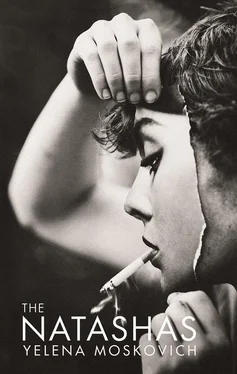4
“In Russian, you don’t have to go missing, it’s a single verb. The verb sits next to your name and you’re gone.
In English you have to work for it. To go. Missing. You have to get up and walk there.”
Polina leaned forward, closer to Béatrice.
“But you French are, as always, the most romantic. Porté disparu. The person must be carried forth missing. In France, there are lines of people waiting, with their arms out, bent elbows, hands cupped towards themselves, each holding a disappearance.”
5
“ Propavshi’ye bez vesti ” Missing without news
In Russia, in order to truly disappear, you must disappear physically and narratively. Since this woman had indefinite time on her hands — the time that was not stolen from her — she glanced at the faces on the board of Missing Persons, one by one.
One looked like a school photo of a girl, maybe thirteen, her hair was wooden-brown and cut jaggedly in layers above her shoulders. The aqua blue shirt she was wearing matched her aqua blue irises, which seemed to be standing back, shy, against the wall of her white pupils. She smiled, as if embarrassed to be there, to be photographed present. (Now that she was absent, she wouldn’t have to be so embarrassed.)
Another was of a seventeen-year-old boy, slightly younger than her own son, with a bristled head, wide eyebrows around his two metal eyes. The photocopy was in black and white and used, so it was hard to tell when it was posted. Years, it must be. Now he may be old enough to be the father of the boy in the photo. She thought about this. She pictured both the father this boy should be now and the boy at the age of his disappearance standing the way her ex-husband and her own son stood in the photo that she had kept in her wallet. The father with his arm around his boy, holding on to each other’s vanishing.
Then there was a man. Maybe thirty-three. He was in a living room, which looked like it was decorated for a film taking place in the 70s. This American woman looked over the patterns with her own nostalgia, then came back to the man. He had his shoulders turned away from the camera, but his neck facing the lens, as if surprised by the snapshot. He had a funny smile on his face, a mouthwatering joy. The woman almost smiled with the man instinctively. Maybe there was a birthday cake waiting in the next room for him. She read the text below. Igor… It was his wife that posted the note. Last seen… waiting for bus… on… --skaya street… Why would she choose such a happy picture of him? It made it seem like he enjoyed surprises and maybe even had a good laugh when he was so suddenly abducted.
The woman moved on to another note. She read the Cyrillic slowly, sliding her finger across the letters to help her move the sound along in her mind. She had to use her full concentration to sound out the words and understand them. Irina… 9 years old… left grandmother’s house to buy milk… never returned… contact… Irina had a round, fresh face, as if she had come in from playing in the snow. The American woman crouched down to see eye to eye with the girl. Her finger touched the girl’s rosy cheek on the shiny photo, and it suddenly felt spongy and cool like a child’s skin in wintertime. The girl’s eyes were soft and trusting. The woman leaned in closer and looked into them.
The sound of keys clinked against each other. A police officer was unlocking the door. But the American woman did not move, her face fixed on the photo.
The officer wiggled the key out of the lock and turned the doorknob. He held the door open and looked at the woman. He said something to her in Russian that she did not hear or did not understand or maybe the police officer didn’t say anything at all and it was the little girl who was speaking Russian to the woman.
Eto ya.
The policeman looked closer at the woman.
“ Eto ya, ” the woman repeated. Or maybe it was the little girl who said it.
“ Ya cibya nashla. That’s me. I found myself.”
The woman pronounced it so finely and fluidly that it confused the policeman. By the looks of her, she was no doubt from the west, and yet the voice which came out of her was right at home.
He squinted and went into his office.
The woman pulled the photo off the bulletin board, folded it, and put it in her pocket. The little girl had been found. Then she walked out of the train station, found the nearest grocery store, and bought a bottle of milk.
She couldn’t have proved much anyways, since she didn’t have any ID, her wallet had been stolen. As it turns out, it’s not that difficult to live without any ID in the Ukraine. Whenever anyone asked her her name, she’d reply, “ Natasha .”
6
“ Telo, Nomer, Chiffre, Youpka… ” Polina repeated
Telo
Body
Nomer
Number
Chiffre
Code
Youpka
Skirt
Yulia
The name of her ten-year-old sister.
Pamyat
Memory.
Stoyimost
Price
Imya , Name
Pizda, Cunt
Yvette , was her name
Istiyourum , I want
Attends ici , wait here
Hier zitten , sit here
Viktoria , was her name
Halt die Klappe , shut up
“ Irina ,” was her name.
7
Young woman, in the window, from the waist up, hair undone and brushed.
“ Pogulyaem? ” A man’s voice calls up. “Let’s go for a walk,” he proposes to the woman with no legs.
1
César ran, side-stepping all obstacles, feet, stroller wheels, car bumpers. He had to get himself to Marcel’s. He had no time to think about direction. He knew that if he just ran, his body would figure it out. His cheeks sponged up the cool air.
He ran down rue Condorcet then turned right on rue de Rochechouart . His ribs pulled him east, then veered him north until his feet slowed on a narrow street called rue des Petits Hotels .
He looked at the buildings on either side of him. The principal structure was a stone-faced middle school, College Bernard Palissy . After that, a pedicure boutique with hazed windows, closed for the weekend already. Then a couple of broad, disappointed-faced buildings which held property or offices for sale signs. Then again, this time to his right, another pedicure boutique, this one with its blinds drawn shut. Was this street inhabited by residents with feet in need of constant maintenance?
At the end of the street, on the corner, was a Stationery & Gift store, also closed. Through the windows, César could see packets of cards arranged geometrically, and pens and pencils packed into plastic containers. The paper selection was in a spectrum of pastel colours. Dim and peaceful, it looked like the newborn baby ward of a hospital, all those greetings waiting to be expressed.
César hadn’t remarked on the name of the street when he turned on to it. If he had, he might have wondered why there wasn’t a single hotel (little or big) on it. This, of course, would have lost him even more time.
His thoughts had already slowed his pace to an idle walk. REEL IT IN, GECKO, a voice sergeanted in his ear and whipped up the soles of his shoes. César took off once more in a sprint.
2
His feet were humid and the shirt beneath his zip-up was sticking to him. He was standing still on a busy street, panting, looking for a street sign.
An African woman walked towards him. Her violet dress was scattered with bright traces like orange peels. She had on a thick headscarf which was the same fabric, and knotted in bulk, on her forehead. Her breasts were pressed down by a piece of fabric with a different pattern, dark etchings, piles of grasshopper legs.
Читать дальше












